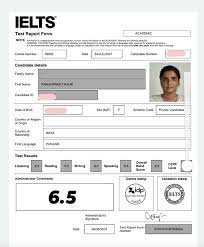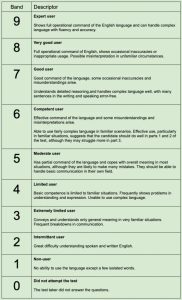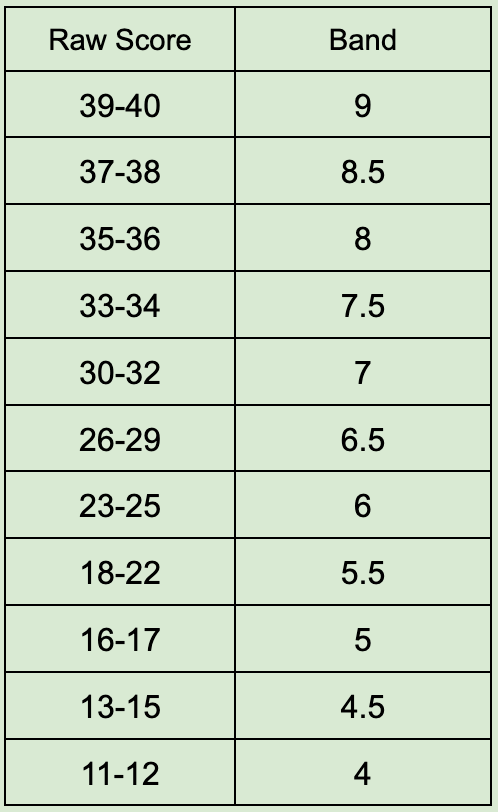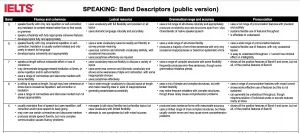In this tutorial, we look at IELTS band scores explained for the reading, writing, listening and speaking sections of the exam.
Table of Contents
- How IELTS is scored
- IELTS Score Descriptors
- IELTS Band Descriptors
- IELTS Writing Band Scores
- IELTS Speaking Band Scores
- IELTS Reading Band Scores
- IELTS Listening Band Scores
- Frequently Asked Questions (FAQ)
How IELTS is scored
The IELTS Test is made up of four sections namely:
- Reading
- Writing
- Listening
- Speaking
You will receive an IELTS score for each of these sections, between band scores 1-9.
Each IELTS score is worth 25% of your overall IELTS band score, so no section of the test is weighted more than the other. To get your overall IELTS band score, each section of the test is calculated and then your band score is the average of those four scores.
Recently, a student asked me, if she needs an IELTS overall 7, does that mean at least a 7 in every skill? That is not necessarily going to be the case.
Overall listening, reading, writing and speaking scores are rounded up to the nearest .5. So, if your average overall raw score is 6.75, this will be rounded up to a 7. You can get your IELTS writing evaluated for free using our new online IELTS essay checker.
However, this is not the case with individual sections of the test where scores are rounded down. For example, in IELTS writing, if you get a 6.75 IELTS score, this would be rounded down to a 6.5 and NOT rounded up to a 7.
All the band scores for listening, reading, writing and speaking will be shown on your test report form with your overall IELTS test score shown clearly.

IELTS Score Descriptors
It’s important to understand the assessment criteria for the IELTS test and to be aware that IELTS scores reflect the command of the language that the test taker is able to demonstrate.
Here is an example of the IELTS score descriptors, for you to get an idea of what is expected for band 6 to band 9.

IELTS Band Descriptors
In order to score at a particular band, the IELTS candidate has to fulfil ALL the positive descriptors for that band. Remember that when we talk about an IELTS 7 band (means level) we can be talking about a 7.0 in a particular skill OR a 7.0 overall score. For example, in speaking, at band 7 under fluency and coherence the positive descriptors are:
- speaks at length without noticeable effort or loss of coherence
- may demonstrate language-related hesitation at times, or some repetition and/or self-correction
- uses a range of connectives and discourse markers with some flexibility
If a candidate fulfils only 1 or 2 of the descriptors, he or she cannot score an overall band score of 7 for fluency and coherence.
IELTS Writing Band Scores
IELTS Task 2 of the exam is worth double the marks of task 1 and there are different band descriptors for each task. As with the speaking test, there are four criteria that are considered:
- Task Achievement
- Coherence and Cohesion
- Lexical Resources
- Grammatical Range and Accuracy.
The band descriptors for Task 1 also include certain criteria relevant only for the general test and others that apply only to academics. For example, for the general test, it is important that test takers use the right tone (formal or informal) in their letters but for the academic test, students must include an overview in their response in order to be considered for a band 6.
You can find band descriptors for Task 1 here, and Task 2 here.
In order to score at a particular band for the writing section, the candidate has to fulfil ALL the positive descriptors for that band. For example, at band 7 under task achievement for task 2 the positive descriptors are:
- Addresses ALL parts of the task
- Presents a clear position THROUGHOUT the response
- Presents, EXTENDS AND SUPPORTS main ideas
If a candidate fails to fulfil all the positive descriptors for this band, he or she cannot obtain a 7 for task achievement. Need examples? There are a lot of writing task 2 topics with answers available for our students.
A student can get their essay evaluated by an ex-IELTS examiner here, and also get an instant online evaluation for free here.
Why you’re stuck at 6.5 in IELTS Writing
Interestingly, from my own personal experience (Ben Worthington), and after talking with numerous other ex-IELTS examiners, I can share some additional information on the marking criteria.
At the moment (July 2022), the writing grading is still quite subjective, for example when we looked at some IELTS writing task 2 topics with answers, one ex-examiner said that she could grade an essay a 6, while another examiner could grade it a 7, and they both would be right.
Also, another examiner mentioned that although numerically the distance between a band score 6.5 and a 7 is 0.5, in reality it is much greater. In other words, the distance between 6.5 and a 7, is far greater than a 6 to a 6.5. It’s useful to look at IELTS writing task 2 topics (academic) with an expert’s feedback to see more examples of strong answers but there is no perfect way to answer an IELTS essay meaning that there will always be slight differences in opinion about band scores.
This probably explains some of the frustration students feel while preparing for IELTS.
IELTS Speaking Band Scores
The IELTS speaking section is scored on 4 criteria:
- Fluency and coherence
- Lexical resources
- Grammatical range and accuracy
- Pronunciation
IELTS Reading Band Scores
The number of correct answers will determine your IELTS reading band score. Each question is worth one mark. Spelling mistakes will be marked as incorrect so it is important that your spelling is as accurate as possible.
IELTS General Reading Scores
Number of correct answers and Band Score
You will need:
- 40 for a Band score of 9
- 39 for an 8.5 band score
- 38 for an 8
- 36 for a 7.5
Remember that scores for reading on the General Training test do not match those of the Academic reading IELTS scoring. See it here
IELTS Academic Reading Scores
Number of correct answers and IELTS Band Score
- 39-40 Band score 9
- 37-38 Band score 8.5
- 35-36 Band score 8
- 33-34 Band score 7.5
- 30-32 Band score 7
- 27-29 Band score 6.5
- 25-26 Band score 6
- 19-22 Band score 5.5
- 15-18 Band score 5
- 13-14 Band score 4.5
- 10-12 Band score 4
- 8-9 Band score 3.5
IELTS Listening Scores
Your IELTS listening band score is calculated in a similar way to reading. The marking for listening is also objective where the number of correct answers will determine your band score. Each question is worth one mark. Spelling mistakes will be marked as incorrect so it is important that your spelling is as accurate as possible to score higher.
The IELTS listening scores are very similar to the Academic reading scores, but remember IELTS scores can vary slightly from paper to paper Make sure that you are able to get the score you’re aiming for in several different practice tests. If not, you’ll need to keep practising.
Listening Test – Raw Score Conversion

Score High with Ease: Online IELTS Essay Checker Guidance
Doing well in the IELTS test is important. Everyone wants to get a high band score. To get a good score in writing, your essays should be very good. But how can you know if your essay is right?
We have the perfect tool to help you. It’s called the online IELTS essay checker. This tool is like having a smart friend. You show it your essay, and it tells you how to make it better. This way, you learn in a quick and easy way. The best part? Using our tool can save you money.
Some people spend a lot on classes and books to get better at writing. Our online IELTS essay checker costs less and works really fast. After you learn about band scores on this page, try our online IELTS essay checker for your essays. It will help you see how to write better and aim for a high score.
To end, our online IELTS essay checker is here to help you do your best in the IELTS writing test. It’s simple to use and can help you save money. We hope it helps you get the band score you dream of. Study hard and good luck!
Frequently Asked Questions (FAQ)
How to calculate the overall band score in IELTS?
IELTS bands can be quite confusing, so take your time and be sure you understand how overall scores work. To get your overall IELTS band score, each section of the test is calculated and then your band score is the average of those four scores. For example
7.0 + 8.0 + 6.0 + 7.0 = 28 (Total of all four modules)
28 / 4 = 7 (Average of the total score)
What is a Band in IELTS?
A band in IELTS is a system used to score you on the IELTS test based on your marks. The IELTS test is scored between Band 1 and 9. Overall scores are rounded up to the nearest .5 For example,
An average of 6.75 is rounded up to Band 7
An average of 5.25 is rounded up to Band 5.5
Your college, immigration department or workplace will only want to know your score to the nearest 0.5 band score – the student who told me very proudly the other day that they received a 6.625 in IELTS wasn’t wrong, but their certificate will have an overall score of 6.5 and that is the score they would need to put on their application. However, as I told them if in a future test they manage to score 6.75, just a little bit higher, that would be rounded up to a 7.0 and so they are very motivated to try again next year.
How to get Band 7 in IELTS?
- Work on your language and exam skills
- Be very aware of your strengths and weaknesses.
- Know your current level by taking a practice IELTS test.
- Get feedback from experts.
For help with your IELTS preparation, take a look at our tutorials:
